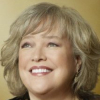Kathy Bates

Kathy Bates
Kathleen Doyle "Kathy" Bates is an American actress and director. After appearing in several minor roles in film and television during the 1970s and the 1980s, Bates rose to prominence with her performance in Misery, for which she won the Academy Award for Best Actress; she also received a Golden Globe. She followed this with major roles in Fried Green Tomatoesand Dolores Claiborne, before playing a featured role as Molly Brown in Titanic, which was at the time the highest...
NationalityAmerican
ProfessionMovie Actress
Date of Birth28 June 1948
CityMemphis, TN
CountryUnited States of America
They sent the material to me as an actress, ... I liked it so much, and I identified with the character and the script so much, I thought: I don't want anybody else telling me what to do, so can I please direct this?
Because I'm a woman, because I'm a character actress, because I'm over 40, I'll be very interested to see, not just for me but for other actresses, how Hollywood treats us in the next ten, fifteen years. I'm hoping that it's not going to be so easy to shove people under the rug, as they have in the past.
The problem I have these days is that women are often cast in a role - as a police officer, for example - and then are invariably perceived by the other characters as succeeding in a man's job, as if they're doing it in spite of being women.
The thing that I've run up against is that it's always been an either-or proposition, especially in Hollywood. You're either young and glamorous and you're going to get the lead and get the man at the end of the picture, or it's the opposite: you're a character actress, you're not attractive enough for the other role, and so you're playing the friend or the killer or the lesbian or the doctor or whatever.
I try to always stretch myself to fit the characters that have been presented.
I was never an ingenue. I've always just been a character actor. When I was younger, it was a real problem, because I was never pretty enough. It was hard, not just for the lack of work, but because you have to face up to how people are looking at you.
I look for a role that hopefully I feel empathy with and that I can understand and love, but also that has that challenge for me to play - a different kind of role, a different type of character, a different time period.
There's only maybe two pages in Jane's book that deals with the marriage because she was really talking only about her becoming an EMT and going through this midlife crisis, ... So when Alan Hines wrote the screenplay, he sat down with Michael Stern and really got down to the bottom of what was going on in that relationship. The work was there in the script.
I am a very private person, ... Not shy exactly, but it takes me a very long time to make friends. I still have such a hard time navigating the waters out here.
what informs her, both as an actress and as a director, is that she's a keen observer of the human condition.
For me as a director, it was important to create this couple as truthfully as I possibly could. Because as she's becoming more comfortable with her new life and her newfound freedom, their professional life is falling apart.
It's the game Brad loved, and he would have wanted us to play.
A lot of Jane's fears are based in her fear of being exposed, ... Because once phobias are exposed, you feel compelled to deal with them. And who wants to do that?
The roles I was lucky enough to get were real stretches for me: usually a character who was older, or a little weird, or whatever. And it was hard, not just for the lack of work but because you have to face up to how people are looking at you.